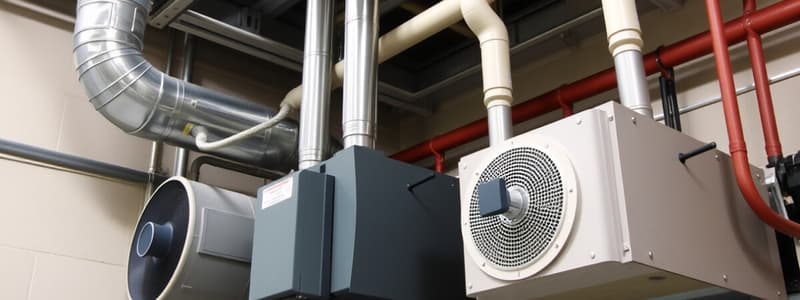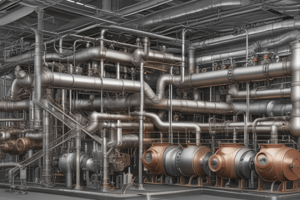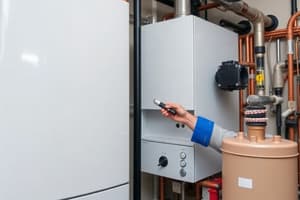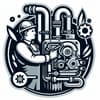Podcast
Questions and Answers
What is the primary function of a boiler?
What is the primary function of a boiler?
- To create steam (correct)
- To distribute electricity
- To cool air
- To circulate air throughout a building
What is a cable tray used for?
What is a cable tray used for?
- Covering long distances to protect wiring in large commercial and industrial buildings (correct)
- Storing electrical cables
- Distributing electricity throughout a building
- Cooling refrigerants in HVAC systems
What does a condenser do in a refrigeration system?
What does a condenser do in a refrigeration system?
- Releases heat to the surrounding area (correct)
- Distributes electricity throughout a building
- Mixes ammonia and water
- Absorbs heat from the surrounding area
What is a conductor in an electrical system?
What is a conductor in an electrical system?
What is the purpose of conduit in an electrical system?
What is the purpose of conduit in an electrical system?
What is a diffusion system used for?
What is a diffusion system used for?
What system controls the distribution of emergency power throughout a building?
What system controls the distribution of emergency power throughout a building?
What is the primary function of a refrigerant in a cooling system?
What is the primary function of a refrigerant in a cooling system?
What happens to elevators during Phase I operation in a fire emergency?
What happens to elevators during Phase I operation in a fire emergency?
Which of the following is a responsibility of HVAC systems?
Which of the following is a responsibility of HVAC systems?
What type of elevator is designed for evacuating occupants in tall buildings?
What type of elevator is designed for evacuating occupants in tall buildings?
What is the role of Phase II elevator operation during a fire emergency?
What is the role of Phase II elevator operation during a fire emergency?
What does the evaporator do in a refrigeration system?
What does the evaporator do in a refrigeration system?
What component of the refrigeration system is responsible for rejecting heat?
What component of the refrigeration system is responsible for rejecting heat?
What is the main purpose of a cable tray in a building's electrical system?
What is the main purpose of a cable tray in a building's electrical system?
What type of power does standby power provide during a power outage?
What type of power does standby power provide during a power outage?
Flashcards are hidden until you start studying
Study Notes
Boilers and HVAC Systems
- Boilers primarily create steam for heating purposes in buildings.
- HVAC systems encompass heating, ventilation, and air conditioning to maintain indoor air quality and comfort.
Electrical Infrastructure
- Cable trays protect and support wiring over long distances in large commercial and industrial buildings.
- Conductors, typically made of copper or aluminum, distribute electricity throughout a building.
- Conduits protect exposed wiring from physical damage, ensuring electrical safety.
Refrigeration Systems
- Condensers release heat to the surrounding area as part of the refrigeration cycle.
- Evaporators cool the surrounding area by absorbing heat from the refrigerant.
- Refrigerants are crucial for absorbing and releasing heat in refrigeration systems.
Elevator Operations and Safety
- Occupant evacuation elevators are designed for buildings exceeding 420 ft (128 m) in height, facilitating safe exits during emergencies.
- Phase I elevator operation involves recalling elevators to the first floor lobby upon smoke detector activation.
- Phase II allows fire fighters to control elevators using special keys, enhancing the efficiency of rescue operations.
- Phase III involves occupants using elevators for self-evacuation before fire fighter assistance arrives.
Emergency Power Systems
- Emergency power provides electricity for critical life-safety features, such as fire pumps and alarm systems, during outages.
- Standby power supports less critical building functions when the main power source fails.
Electrical Control Systems
- Electrical service panels manage circuit conductors and power supply, centrally controlling the electrical system's safety and functionality.
- Cable trays and conduits play essential roles in protecting and organizing electrical wiring within a building.
Studying That Suits You
Use AI to generate personalized quizzes and flashcards to suit your learning preferences.





